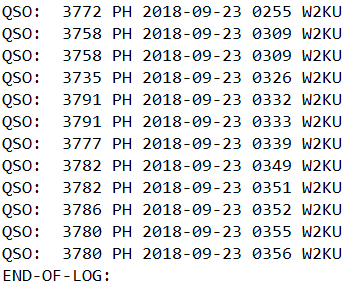Amateur Radio Contests tips for new and experienced operators who wish to improve their skills. Ham radio contests stand as exhilarating showcases of skill, strategy, and camaraderie within the amateur radio community. From local competitions to grand international events, these contests offer operators a platform to flex their radio prowess. Operators aim to log as many contacts as possible within a specified time frame.
Success in these contests hinges not only on technical proficiency, but also on strategic planning and effective log submission processes. There are many aspects to being a successful contest operator before you get to submitting a log. Some of these are:
- Contest rules and operating times
- Band selection
- Propagation
- Radio and antenna setup
- Endurance
- Logging
- Submitting a log
Improving in even one of these areas will make you a better contest operator. Let’s break these down into sections and each will include my improvement tip.
Contest Rules and Operating Times:
The first thing to check is the contests operating time to make sure you can participate. The more time you can put into the contest will improve your score. Secondly, you will need to understand the rules because each contest has different rules.
Lastly, know your exchange and how many times you can word a station per band. The large contest stations will be working on several bands and can add points to your log. A good site for this is the contest calendar by WA7Bnm
Tip 1: Work the same station on several bands.
Band Selection:
The rules will tell your what bands are in play. Decide on what bands to work, this may depend on you available antennas. Planning to work the bands that are open, follow the band openings.
If two band are open work the one that closes first, then move to the other. Monitor band activity and adjust your operating frequency to avoid interference and maximize contact opportunities.
Navigating the crowded bands of a contest requires careful planning and strategic decision making. Pick a frequency and hold it if you are calling station.
Tip 2. Follow the band openings.
Propagation:
Propagation is not something you can improve, you need to learn to work with what you have. However, what you can do is educate yourself on propagation to understand how it works with band openings.
Research the propagation predictions for the contest operating time. There are plenty of websites and tools available to assist you. Use one during the contest to monitor the propagation patterns. Make band changes if propagation changes.
Tip 3. Monitor propagation during the contest.
Radio and Antenna Setup
Set up extra antennas to add bands if you have the room and need the bands. After all, more bands equals more contacts. Make sure all connections are tight and waterproof, you do not want to lose an antenna if it rains.
Test you radio and amplifier, make sure everything is working properly. Make changes if needed to maintain or improve working conditions. Have back-ups of everything that is essential if you can afford.
Tip 4. Test your setup is operating properly.
Endurance:
Contests can last up to 48 hours or more. So that means physical endurance is going to play a roll in your success. To talk or send CW for 8 or 10 hours straight is difficult, you will need to train properly.
You can get out and walk, bike, use gym equipment. Lifting weights would be good for endurance and hand strength. It is easy to find a way to incorporate exercise into your daily life, some of these could be:
- Park out further in parking lots to walk more
- Take the stairs instead of the elevator
- Go for a walk, jog, or bile ride
- Do calisthenics
- Join a gym
- Go dancing, or learn to dance
Tip 5. Improve your endurance with exercise.
Amateur Radio Contests Tips for Logging
Keeping Contact Logs:
After the contest concludes, the process of submitting logs begins. Use a reputable logging software program to generate electronic contest log. Ensure your logs include all necessary information, such as signal reports, timestamps, and exchange information.
Maintain meticulous logs to ensure compliance with contest rules and the scoring criteria. Any incomplete information can disqualify a contact. Review your log files carefully for accuracy and completeness, checking for any errors or discrepancies. Correct any inaccuracies before submitting your logs.
Tip 6. Check you log for errors and fix them.
After you are sure your logs are correct, then you want to convert them to the correct format. Most contest want logs submitted in the Cabrillo format, Your logging program can do the conversion.
The contest website will have the place to send the log, follow those instruction. Naturally, you will need to enter any additional information at this time. After submitting your logs, follow up with the contest organizers to confirm receipt and ensure your submission is complete.
Address any issues or discrepancies promptly to resolve any potential scoring discrepancies. There will be a deadline to get this finished.
Tip 7. Submit before deadline and confirm.
Amateur Radio Contests Tips
- Tip 1: Work the same station on several bands.
- Tip 2. Follow the band openings.
- Tip 3. Monitor propagation during the contest.
- Tip 4. Test your setup is operating properly.
- Tip 5. Improve your endurance with exercise.
- Tip 6. Check you log for errors and fix them.
- Tip 7. Submit before deadline and confirm.
By employing strategic tactics and adhering to proper log submission procedures, amateur radio operators can maximize their success. While competing in contests you will contribute to the vibrant and competitive spirit of the amateur radio community.
